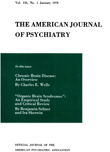Early Stress and Later Response to Separation in Rhesus Monkeys
Abstract
The hypothesis that separation in early life predisposes one to later psychopathology was tested using two groups of rhesus monkeys of similar age. The experimental group had undergone the stress of early life separation and confinement in a vertical chamber. The experimental animals responded to separation and reunion with increased self-mouthing, self-clasping, huddling, and rocking. The control group responded to separation with increased locomotion and responded to reunion with increased contact clinging and proximity behaviors. The implications of these findings are discussed.
Access content
To read the fulltext, please use one of the options below to sign in or purchase access.- Personal login
- Institutional Login
- Sign in via OpenAthens
- Register for access
-
Please login/register if you wish to pair your device and check access availability.
Not a subscriber?
PsychiatryOnline subscription options offer access to the DSM-5 library, books, journals, CME, and patient resources. This all-in-one virtual library provides psychiatrists and mental health professionals with key resources for diagnosis, treatment, research, and professional development.
Need more help? PsychiatryOnline Customer Service may be reached by emailing [email protected] or by calling 800-368-5777 (in the U.S.) or 703-907-7322 (outside the U.S.).



